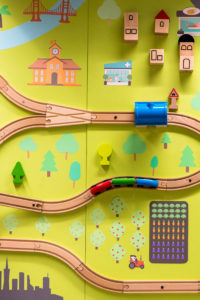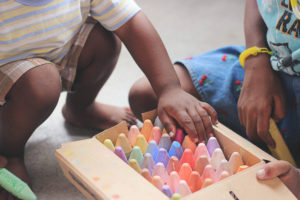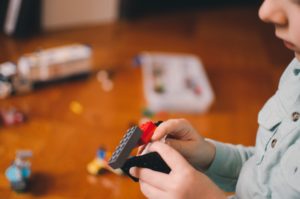Play therapy for children might sound too simple at first. Don’t children play anyway? What is therapeutic about it? Play isn’t just playing, though. It’s a vital part of a child’s world, and as such it provides a powerful treatment modality in therapy for children.
 As they play in their everyday lives, children learn more about the world and process their experiences in it. This is similar to how adults process their daily lives in conversation with one another. And just as adults engage in talk therapy to process their emotions and experiences, children participate in play therapy as part of the therapeutic process.
As they play in their everyday lives, children learn more about the world and process their experiences in it. This is similar to how adults process their daily lives in conversation with one another. And just as adults engage in talk therapy to process their emotions and experiences, children participate in play therapy as part of the therapeutic process.
Play therapy for children uses evidence-based methods, providing a therapeutic setting where children can learn, become better communicators, develop social skills and a capacity for emotional regulation, and more.
Since the ancient days of Plato, philosophers and intellectuals have understood the foundational role of playing in a child’s life—how crucial play is for children’s well-being and development. Through play, children explore their environments and their relationship with the world around them.
So when was play first used in therapy for children? Hermine Hug-Hellmuth, an Austrian psychoanalyst, was the first to encourage children in a therapy room to play as a form of self-expression. As she observed children playing in this setting, she realized she could understand them better by watching them play – more so than by talking with them. Their play gave her profound insights into their thoughts and feelings.
Throughout the following decades, the practice of using play in therapy evolved and psychologists developed many techniques for its use. Play was the key to the most in-depth insights into children’s thoughts and feelings, and in turn, the way to help them overcome their struggles.
Today, evidence-based psychology offers many different forms of play therapy, including cognitive behavioral therapy play, directive play, non-directive play, sand tray therapy, etc. Play therapy is most often used for children under 12, although some research has indicated play therapy can be beneficial for teenagers and even adults.
Why is play therapy so effective? It offers a safe and non-threatening environment for a child to open up with the therapist. Talk therapy with a child can seem more like an interrogation than a conversation; play therapy helps children not to feel intimidated.
Non-verbal processing is an essential component of play therapy. This might include art, role-playing, dance or other movements, storytelling, and creative visualization. Children’s brains, at their immature level of development, are more amenable to non-verbal processing than talk therapy.
For example, if you ask a child to explain the reasons behind her behavior, she might respond, “I don’t know.”
She isn’t answering this way to avoid getting into trouble as an adult might, but because she doesn’t have the verbal processing skills to describe her reasoning. Even if her thought process is clear to her, she can’t yet express it verbally, especially when strong emotions are involved.
 The frontal lobe is the area of the brain that controls thought, emotional regulation, and the processing of emotions. The frontal lobe doesn’t finish developing until about age 25. When a child experiences an event, the memory and feelings related to it are stored in a non-verbal area of their brain. If a child is less than 12, they will have trouble verbally describing their reaction to an event.
The frontal lobe is the area of the brain that controls thought, emotional regulation, and the processing of emotions. The frontal lobe doesn’t finish developing until about age 25. When a child experiences an event, the memory and feelings related to it are stored in a non-verbal area of their brain. If a child is less than 12, they will have trouble verbally describing their reaction to an event.
This is why when a child experiences a traumatic event, talk therapy probably won’t help them heal or process their emotions. Instead, drawing, sand tray, role-playing, or other non-verbal interventions can help a child process their trauma without words.
Play therapy is valued in psychology because it is tailored for children’s level of cognitive development and capacity for processing, allowing them to find healing and manage their emotions. Play-centered therapy for children can have a long-lasting impact on their ability to function and thrive in their lives.
The goal isn’t just to eradicate the symptoms of trauma but to get to the heart of the matter in a way that’s most effective and comfortable for the child.
What Symptoms Does Play Therapy Treat?
Play therapy can be used for all ages, even adults, and can be applied to a wide range of mental health disorders and symptoms:
- Traumatic events or crises, the loss of a loved one, or parental divorce.
- Anxiety disorders, including obsessive-compulsive disorders. Play therapy can help clients improve their confidence and reduce their anxiety.
- Developmental disorders, including Autism Spectrum Disorder. Clients with these disorders can develop better social skills and increased independence.
- Behavioral disorders, including oppositional defiant disorders or conduct disorders. Play therapy can help these clients manage their emotions in a way that is respectful to themselves and everyone around them.
- ADHD. Children can learn to manage their energy levels and channel them appropriately.
- Troubling symptoms in the absence of a diagnosis, including learning difficulties, isolation, anger, defiance, irrational fears or phobias, anxiety, depression, social anxiety, and more. Play therapy can improve functioning in all of these areas.
How Can Play Therapy Make a Long-Lasting Impact on My Child?
The goal of therapy is for the client to be able to identify and healthily process their emotions. If the client masters this ability, they will experience positive effects long after therapy has ended.
![]() The therapeutic environment is meant to be safe and free from the stressors of the outside world. For therapy to be effective, the skills learned there must be applied in the messy and chaotic “real world” of everyday life. This happens when a client mentally grasps the skills they’re learning and then practices those skills repeatedly.
The therapeutic environment is meant to be safe and free from the stressors of the outside world. For therapy to be effective, the skills learned there must be applied in the messy and chaotic “real world” of everyday life. This happens when a client mentally grasps the skills they’re learning and then practices those skills repeatedly.
For children, play is the easiest method of understanding these new, valuable skills they’ll learn in therapy. They can process their painful emotions and practice their newfound abilities through play. When they’ve been able to process their experiences and manage their response to them, they’ve gained powerful coping techniques that will carry them through to adulthood.
Play therapy opens a window to understanding other people’s emotions as well as one’s own feelings, allowing a child to develop empathy, navigate friendships and other relationships, and gain confidence.
Children can also learn how to experience emotions healthily and productively instead of exploding in anger and throwing tantrums in defiance. Play therapy allows children to learn that having feelings is something that everyone experiences.
Learning to manage their emotions will help a child throughout his or her life. Rather than throwing a tantrum, responding defiantly, or exploding in anger, a child will learn that emotions are healthy and that they can experience these big feelings without emotional or physical outbursts. The ability to self-regulate will enable a child to be more resilient and have better relationships now and later in life.
Taking personal responsibility is a valuable life lesson that’s emphasized in therapy. Part of that is developing ways to manage one’s emotions, healthily addressing them. In play therapy, children can start to build their own creative solutions to the problems they face, taking ownership of their actions instead of being reactive.
They will develop a sense of respect for themselves and others, and how to accept the things they cannot change. Play therapy for children provides a learning environment for empathy and respect for others’ thoughts and feelings.
Other essential characteristics that are cultivated in play therapy for children include:
- Respecting yourself and others.
- Developing confidence in your personal identity and capacity for positive change.
- Developing empathy for others’ thoughts and feelings.
- Accepting circumstances you can’t change.
Learning these skills in play therapy increases a child’s potential to be a successful, high-functioning adult who can navigate difficulties in a healthy way.
How Will Play Therapy Impact My Family?
A child who engages in play therapy will benefit in ways that also help their family, removing the stress of tantrums or other challenging behaviors. Treatment doesn’t occur in a vacuum, though. Children’s environments have a dramatic effect on them, and to maintain the skills they’ve gained in play therapy, their environment needs to grow with them.
 The most immediate environment for a child is their family. As a child learns and grows in the therapy process, their family must learn and improve as well in order to help maintain the child’s progress.
The most immediate environment for a child is their family. As a child learns and grows in the therapy process, their family must learn and improve as well in order to help maintain the child’s progress.
A simple baseline parents can use to measure quality time with their children is 15 minutes per day, per child, of one-on-one time. Remaining consistent with this time will go a long way towards keeping the family thriving.
Parent-Child Interactive Therapy is one form of play therapy used to help the parent/caregiver and child improve their relationship. In this intervention, the parent and child play together, and the therapist provides guidance and feedback on play and discipline. Parent-Child Interactive Therapy encourages child-centered play, which fosters a child’s imagination, independence, and self-esteem.
This form of play therapy provides a setting for practicing discipline as the parent gives a command and learns good methods of training when the child does not obey. The discipline techniques taught in play therapy help children behave based on their ability to handle boundaries and emotions, instead of responding in fear or anger.
When a child’s home life reflects the techniques and boundaries of the therapy setting, there is excellent potential for long-lasting benefits for the child and family. Parents using play skills can help their child be more obedient and bonded to them. As a result, home life will be less stressful and chaotic and more peaceful and enjoyable.
Where Can I Find Someone Who Does Play Therapy for Children?
If you have a child who could benefit from these processing skills through play, contact a local therapist. If you are in or around Culver City, Washington and looking for a therapist who can bring the values and morals of the Christian faith in with play, come to Culver City Christian Counseling. Don’t wait; make an appointment to start your healing and learning process today.
If you want your child to experience the benefits of processing through play therapy, contact one of the counselors at Culver City Christian Counseling today. Faith-based play therapy for children can be the first step towards healing and health for your child and family.
“Toy Trains”, Courtesy of Jason Leung, Unsplash.com, CC0 License; “Sidewalk Chalk”, Courtesy of Tina Floersch, Unsplash.com, CC0 License; “Art”, Courtesy of rawpixel, Unsplash.com, CC0 License; “Building a Rocket”, Courtesy of Kelly Sikkema, Unsplash.com, CC0 License
-
Kate Motaung: Curator
Kate Motaung is the Senior Writer, Editor, and Content Manager for a multi-state company. She is the author of several books including Letters to Grief, 101 Prayers for Comfort in Difficult Times, and A Place to Land: A Story of Longing and Belonging...





